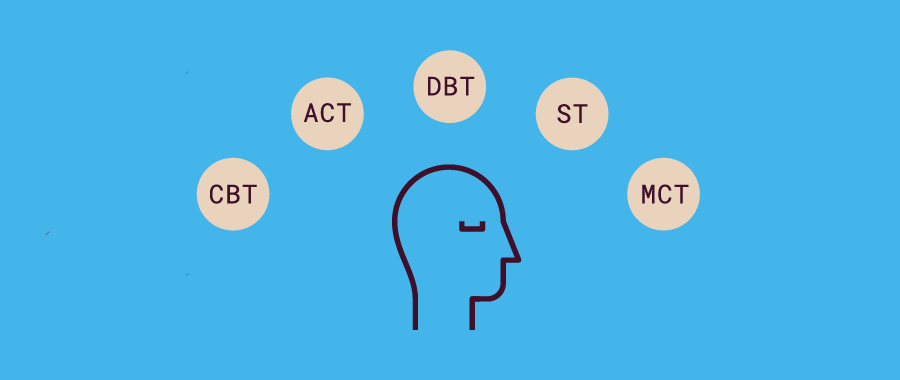
Understanding the different types of therapy
If you are considering starting therapy, you may have done a Google search and found that lots of different types of therapy exist. Or, you might already be seeing a psychologist and they have introduced a strategy or concept that comes from a particular approach. But what exactly do all these types of therapy mean? Here is a quick guide to five common therapy approaches you may come across:
Cognitive Behavioural Therapy
Cognitive Behaviour Therapy, or CBT, is a therapy that has been around since the 1960s. CBT says that the way that we think (i.e., our cognitions) and what we do (our behaviour) affects our mood. CBT can help you identify unhelpful thinking styles and come up with different ways of thinking. It can also be helpful for changing patterns of behaviour that might not be serving you well. As CBT has been around for over five decades, a lot of research has examined its efficacy for treating a range of mental health difficulties, such as depression and anxiety.
Dialectical Behaviour Therapy
Dialectical Behaviour Therapy, also known as DBT, is a branch of CBT that was developed in the 80s for those who find it difficult to regulate their emotions. This approach focuses on dialectics, or two opposing ideas. For example, you can acknowledge that you are doing the best you can, and that you want to try harder. Although these might seem to be two opposing facts, both are true at the same time. This therapy focuses on how to compromise and find a middle ground between two opposing points of view. It can also help with building skills in tolerating distress, regulating emotions, assertiveness, and mindfulness.
Acceptance and Commitment Therapy
When an unpleasant emotion comes up, our instinct is to get rid of it. Although this approach works for problems in our external world (like calling a tow truck if your car breaks down), attempts to control or suppress our internal world of thoughts and emotions tends not to work that well – in fact, it can sometimes make us more distressed. So, what do we do? Acceptance and Commitment Therapy, or ACT (pronounced “act”), would say that we can work on accepting things that we cannot change, while making a commitment to strive for things that we have some control over and are important to us. This therapy can be helpful for difficulties including anxiety, depression, and chronic pain.
Metacognitive Therapy
We have thousands of thoughts a day. So why do some of these thoughts get stuck in our head, whereas others seem to go in one ear and out the other? Metacognitive therapy tells us that it might be down to our metacognitive beliefs – that is, the beliefs we hold about our thinking. For instance, if we have a belief that worrying is uncontrollable, it makes sense that we would then feel anxious about our worry. This might also keep the worried thoughts around and make us feel more anxious overall. Metacognitive therapy helps us look more closely at these beliefs and how we cope with our thoughts. This therapy can be helpful for individuals struggling with worry or rumination, which are commonly seen in depression, anxiety, and other disorders like obsessive-compulsive disorder.
Our upcoming Overcome Overthinking and Worry Group will be utilising Metacognitive Therapy principles. Clink here to read more about the group and to register your interest if you’d like to attend!
Schema Therapy
Have you ever noticed unhelpful patterns throughout your life, which affect how you think about yourself, others, and the world more broadly? Schema therapy would say that these are due to schemas – these are themes or patterns of thinking, feeling, and behaving which develop during childhood and adolescence, and are elaborated on throughout our lives. Some examples of schema beliefs include “I’m a failure”, “the world is a cruel place and people will hurt me” or “people that I love will leave me”. These schemas might drive us to respond a certain way, which can get in the way of achieving our goals, and which ultimately reinforce our unhelpful schemas. Schema therapy can be a useful approach to identify and break these patterns.
Written by Chloe Giffard, Clinical Psychology Registrar
More information
If you would like to know about how these types of therapy might be helpful for you, or want to book an appointment with Chloe Giffard or another one of our experienced clinical psychologists, contact our friendly client team by calling 6143 4499 or email via our contact page.

Contact
Ph: (08) 6143 4499
Fax: (08) 9200 5696
Monday to Thurs 8:30am - 7:30pm
Friday 8:30am - 4:30pm
Saturday 8:30am - 2:30pm
Locations
6 Outram Street
West Perth, 6005 WA
36 St Quentin Avenue
Claremont, 6010 WA
In the spirit of reconciliation, Lawson Clinical Psychology acknowledges the Traditional Custodians of country throughout Australia and their connections to land, sea and community. We pay our respect to their Elders past and present and extend that respect to all Aboriginal and Torres Strait Islander peoples today.
Lawson Clinical Psychology celebrates the extraordinary diversity of people’s bodies, ability, genders, sexualities and relationships that they represent.
Copyright © 2024 Lawson Clinical Psychology. All Rights Reserved. Privacy Policy.
